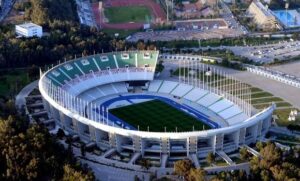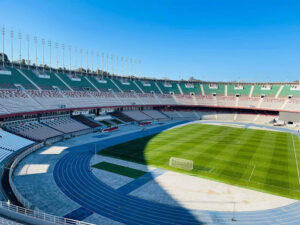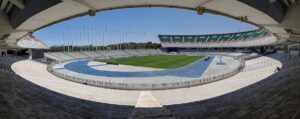Stade Du 5 Juillet: A Monument of Sporting Triumphs and Unity in Algeria
Stade du 5 Juillet, also known as the July 5th Stadium, is a symbol of Algerian sporting triumphs and unity. Located in the heart of Algiers, the capital city of Algeria, the stadium serves as a hub for sports enthusiasts and a source of pride for Algerians. It is a monument to the country’s independence and a testament to the Algerian spirit that soars high.
Historically significant, Stade du 5 Juillet was inaugurated in 1972 with a capacity of 95,000, making it the largest sports venue in Algeria. It has hosted numerous high-profile events, including the finals of the Algerian Cup, the matches of the national football team, and major athletic competitions such as the Mediterranean Games, the All-Africa Games, and the Pan Arab Games. The stadium was also one of two venues of the 1990 African Cup of Nations, where it hosted nine matches.
The cultural and social impact of Stade du 5 Juillet cannot be overstated. It is a place where Algerians of all backgrounds come together to celebrate their love of sports and their national identity. The stadium has witnessed some of the most memorable moments in Algerian sporting history, including the national football team’s historic victory over West Germany in the 1982 FIFA World Cup. It is a place where the Algerian spirit is on full display, and where the country’s sporting prowess is celebrated.
Key Takeaways
- Stade du 5 Juillet is a symbol of Algerian sporting triumphs and unity.
- The stadium has a rich history of hosting high-profile events and is a source of pride for Algerians.
- Stade du 5 Juillet is a cultural and social hub where the Algerian spirit soars high.
Historical Significance

Inception and Construction
Stade du 5 Juillet, also known as July 5th Stadium, is a sporting arena located in Algiers, Algeria. The stadium was built in 1972 to commemorate the country’s independence, which was declared on July 5, 1962. The stadium was designed by the French architect Marius Toudoire and constructed by the Algerian National Company for Construction and Public Works.
Renovations and Modernization
Over the years, the stadium has undergone several renovations and modernization projects to keep up with international standards. In 1990, the stadium was one of two venues for the African Cup of Nations, which prompted the construction of a new VIP stand and the installation of a new scoreboard. In 2003, the stadium underwent a major renovation, which included the installation of a new athletics track, new seats, and a new sound system.
Major Sporting Events
Stade du 5 Juillet has hosted several major sporting events, including the 1975 Mediterranean Games, the 1978 All-Africa Games, and the 2004 Pan Arab Games. The stadium has also been the home ground for several Algerian football clubs, including MC Alger, USM Alger, and CR Belouizdad. The stadium has a seating capacity of 64,000 and has hosted several international football matches, including the 2009 FIFA World Cup qualification match between Algeria and Egypt.
In conclusion, Stade du 5 Juillet is a significant monument of Algerian sporting triumphs and unity. The stadium’s historical significance, coupled with its modern amenities, has made it a popular venue for sporting events and a source of pride for the Algerian people.
Cultural and Social Impact

Symbol of National Pride
Stade du 5 Juillet is not just a stadium; it is a symbol of national pride for Algeria. The stadium’s name refers to the date of the proclamation of the country’s independence, and it has played a significant role in the country’s history. The stadium’s design and construction were a testament to the country’s technological and engineering prowess, and its capacity of 95,000 spectators made it one of the largest stadiums in Africa.
Venue for Unity and Celebration
The stadium has been a venue for many important events, both sporting and cultural. It has hosted several international sporting events, including the 1975 Mediterranean Games, the 1978 All-Africa Games, and the 2004 Pan Arab Games. The stadium has also been used for concerts and other cultural events, bringing people together from all over Algeria to celebrate their shared heritage and identity.
Economic and Urban Influence
Stade du 5 Juillet has also had a significant economic and urban impact on Algeria. The stadium’s construction provided jobs for thousands of Algerians, and its location in the heart of Algiers has made it a hub for economic activity and development. The stadium’s presence has helped to transform the surrounding area into a vibrant urban center, with restaurants, shops, and other businesses catering to the needs of visitors to the stadium.
In conclusion, Stade du 5 Juillet is not just a stadium; it is a monument to Algeria’s sporting triumphs and its unity as a nation. Its cultural and social impact has been immense, serving as a symbol of national pride, a venue for unity and celebration, and a catalyst for economic and urban development.
Frequently Asked Questions

What is the seating capacity of Stade du 5 Juillet?
Stade du 5 Juillet has a seating capacity of 64,000 spectators. It is one of the largest stadiums in Africa and the largest in Algeria.
Which significant sporting events have been hosted at Stade du 5 Juillet?
Stade du 5 Juillet has hosted several significant sporting events such as the 1975 Mediterranean Games, the 1978 All-Africa Games, the 2004 Pan Arab Games, and the 2007 All-Africa Games. The stadium has also hosted numerous international football matches and is home to the Algerian national football team.
How does Stade du 5 Juillet reflect Algerian culture and unity?
Stade du 5 Juillet is a symbol of Algerian culture and unity. The stadium was built in 1972, just ten years after Algeria gained independence from France. Its name, which refers to the day Algeria declared independence, is a testament to the country’s struggle for freedom. The stadium has since become a gathering place for Algerians to celebrate their sporting achievements and national pride.
What are the facilities and amenities available at Stade du 5 Juillet?
Stade du 5 Juillet is a modern stadium with several facilities and amenities. It has a VIP lounge, a press room, and a medical center. The stadium also has several food and beverage outlets, including fast food restaurants, cafes, and bars.
Has Stade du 5 Juillet undergone any major renovations or upgrades?
Stade du 5 Juillet underwent a major renovation in 2003, which included the installation of a new seating system, a new sound system, and a new scoreboard. The stadium also underwent a significant upgrade in 2019, which included the installation of a new pitch, new floodlights, and a new security system.
How can one get to Stade du 5 Juillet and are there any visitor tours available?
Stade du 5 Juillet is located in the heart of Algiers, the capital city of Algeria. It is easily accessible by public transport, including buses and trains. Visitors can also take a taxi or drive to the stadium. There are no official visitor tours available, but visitors can attend matches and events held at the stadium.
Other Articles:
Also See: Cairo International Stadium: Egypt’s Iconic Venue for Sports and Culture
Also See: Stade des Martyrs de la Pentecôte: The Heart of Congolese Sport and Culture
Also See: Borg El Arab Stadium: Egypt’s Massive Arena
Also Check: Exploring Moses Mabhida Stadium: A Landmark in Durban, South Africa
Also Check: Loftus Versfeld Stadium: A Premier Sports and Entertainment Venue
Tags: Cultural and Social Impact, Frequently Asked Questions, Historical Significance, Stade Du 5 Juillet: A Monument of Sporting Triumphs and Unity in Algeria